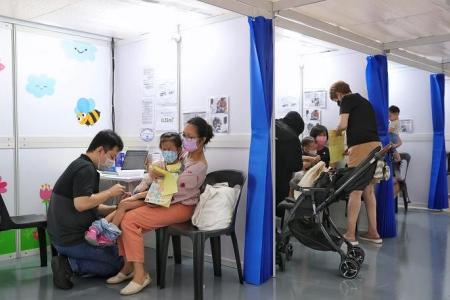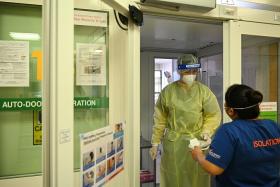One-third of parents in Singapore hesitate to get their children vaccinated against Covid-19: Study
About one-third of parents in Singapore are hesitant about getting their children vaccinated against Covid-19, a study has found.
The study was conducted by a team of paediatricians from the Khoo Teck Puat - National University Children’s Medical Institute at the National University Hospital (NUH) .
Another key finding was that those who had reservations about getting their children vaccinated against Covid-19 were less likely to trust their child’s doctors.
Results from the study show that only 42 per cent of vaccine-hesitant parents fully trusted their child’s doctor, compared with about 68 per cent of parents who were not vaccine-hesitant.
“This informs us that we really have to work very closely with every parent to make that informed decision for their child to ensure the best outcome,” said Dr Lee Le Ye, one of the authors of the study.
The survey involved 628 parents between the ages of 32 and 45, and was conducted between November 2021 and March 2022, through electronic platform Form SG.
QR codes to access the electronic survey were placed around NUH, including the paediatrics and obstetrics wards, and e-mails were sent to hospital staff.
Singapore began offering Covid-19 vaccinations for children between the ages of six months and four years from Tuesday.
To build trust, Dr Lee, who is also the senior consultant at NUH’s neonatology department, said that a tailored approach is needed for every parent.
Doctors can take the opportunity to educate parents on vaccinations for Covid-19 during their child’s medical consultations, when they will be more open to such information, she said.
Parents also have different concerns.
“One parent might be worried about the dose, while another might be worried about the side effects. Another might be worried about logistics, or whether they should be spacing out the Covid-19 vaccinations between another routine standard vaccination,” she said, adding that parents bring their children in for multiple vaccinations under the National Childhood Immunisation Schedule around the age of one.
NUH nurse Illene Chen, 30, who participated in the study, said she was unsure if her two-year-old daughter, who recovered from Covid-19 in August, should take a dose of the vaccine.
As for her two-month old son, she would prefer for him to finish his compulsory childhood immunisations first before considering the Covid-19 vaccine.
She said she was planning to discuss these issues with her family doctor.
“Whatever the doctor recommends, we will take his advice,” said Ms Chen, who added that she was leaning towards vaccinating her children against Covid-19 given the recent rise in cases driven by the XBB strain.
The survey also found that mothers were less vaccine-hesitant than fathers.
Researchers say one potential reason is that mothers are usually the ones taking children for compulsory vaccinations, so they have more opportunities, compared with fathers, to establish trust with healthcare professionals.
“We want the family to come together to make concise decisions that will benefit their children,” said Dr Lee, who pointed out that fathers play an important role as there are instances of parents disagreeing on Covid-19 vaccinations for their children.
Other findings from the study include that vaccine hesitancy was significantly associated with lower educational level, lower household income, as well as being unvaccinated for Covid-19.
Dr Lee urged parents to get their children vaccinated against the coronavirus.
“Children, especially the younger ones, actually do have a more severe (form of the) disease - requiring hospitalisations, ICU care and oxygen supplementation. Hence, it is important for us to protect these children,” she added.
Get The New Paper on your phone with the free TNP app. Download from the Apple App Store or Google Play Store now


